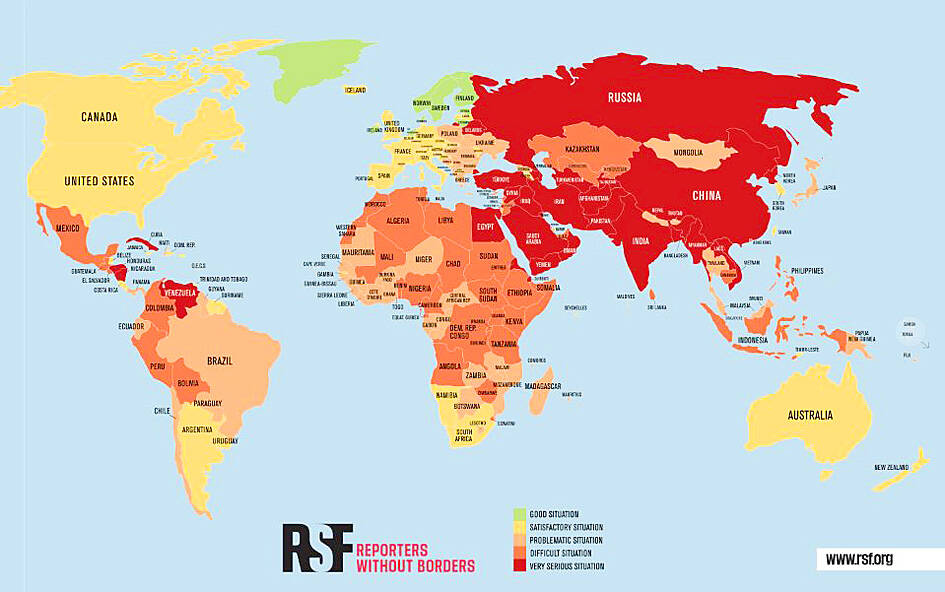China was the biggest global jailer of journalists last year with more than 100 behind bars as Chinese President Xi Jinping’s (習近平) government tightened control over society, Reporters Without Borders said on Wednesday.
The Chinese government was also one of the biggest exporters of propaganda, according to the media freedom group.
China was listed second, behind only North Korea, in the group’s annual index of media freedoms.

Photo courtesy of the Reporters Without Borders (RSF)
The Chinese Communist Party (CCP) has tightened already strict controls on media in China, where all newspapers and broadcasters are state-owned.
Web sites and social media are required to enforce censorship that bans material that might spread opposition to the country’s one-party rule.
Xi, China’s most powerful figure in decades, called for journalists to adhere to “the correct orientation of public opinion” during a 2016 meeting with reporters who had been awarded official prizes.
Xi is pursuing a “crusade against journalism,” the report said, adding that the decline in China’s media freedoms was “disastrous.”
Beijing operates what is regarded as the world’s most extensive system of Internet controls. Its filters try to block the Chinese public from seeing Web sites abroad operated by news outlets, governments and human rights groups.
Chinese journalists have been prosecuted on charges of spying, leaking national secrets and “picking quarrels,” a vague accusation used to jail dissidents. Others are subjected to surveillance, intimidation and harassment.
Journalist Dong Yuyu (董鬱玉), who worked at a CCP-affiliated newspaper and is a former Harvard University fellow, faces espionage charges after being detained for more than a year, his family said last week.
Chinese-born Australian journalist Cheng Lei (成蕾) last year was tried in China on national security charges, but has yet to learn the verdict, Australian Minister for Foreign Affairs Penny Wong (黃英賢) said in March.
Cheng worked for CGTN, the English-language state television channel aimed at foreign audiences. She was detained in August 2019 and accused of sharing state secrets.
In Hong Kong, the CCP forced the Apple Daily newspaper to shut down as part of a crackdown on pro-democracy sentiment.
Apple Daily founder Jimmy Lai (黎智英) was convicted of fraud last year, a charge his supporters said was politically motivated. Six other former executives pleaded guilty.

CLASH OF WORDS: While China’s foreign minister insisted the US play a constructive role with China, Rubio stressed Washington’s commitment to its allies in the region The Ministry of Foreign Affairs (MOFA) yesterday affirmed and welcomed US Secretary of State Marco Rubio statements expressing the US’ “serious concern over China’s coercive actions against Taiwan” and aggressive behavior in the South China Sea, in a telephone call with his Chinese counterpart. The ministry in a news release yesterday also said that the Chinese Ministry of Foreign Affairs had stated many fallacies about Taiwan in the call. “We solemnly emphasize again that our country and the People’s Republic of China are not subordinate to each other, and it has been an objective fact for a long time, as well as

‘CHARM OFFENSIVE’: Beijing has been sending senior Chinese officials to Okinawa as part of efforts to influence public opinion against the US, the ‘Telegraph’ reported Beijing is believed to be sowing divisions in Japan’s Okinawa Prefecture to better facilitate an invasion of Taiwan, British newspaper the Telegraph reported on Saturday. Less than 750km from Taiwan, Okinawa hosts nearly 30,000 US troops who would likely “play a pivotal role should Beijing order the invasion of Taiwan,” it wrote. To prevent US intervention in an invasion, China is carrying out a “silent invasion” of Okinawa by stoking the flames of discontent among locals toward the US presence in the prefecture, it said. Beijing is also allegedly funding separatists in the region, including Chosuke Yara, the head of the Ryukyu Independence

UNITED: The premier said Trump’s tariff comments provided a great opportunity for the private and public sectors to come together to maintain the nation’s chip advantage The government is considering ways to assist the nation’s semiconductor industry or hosting collaborative projects with the private sector after US President Donald Trump threatened to impose a 100 percent tariff on chips exported to the US, Premier Cho Jung-tai (卓榮泰) said yesterday. Trump on Monday told Republican members of the US Congress about plans to impose sweeping tariffs on semiconductors, steel, aluminum, copper and pharmaceuticals “in the very near future.” “It’s time for the United States to return to the system that made us richer and more powerful than ever before,” Trump said at the Republican Issues Conference in Miami, Florida. “They

GOLDEN OPPORTUNITY: Taiwan must capitalize on the shock waves DeepSeek has sent through US markets to show it is a tech partner of Washington, a researcher said China’s reported breakthrough in artificial intelligence (AI) would prompt the US to seek a stronger alliance with Taiwan and Japan to secure its technological superiority, a Taiwanese researcher said yesterday. The launch of low-cost AI model DeepSeek (深度求索) on Monday sent US tech stocks tumbling, with chipmaker Nvidia Corp losing 16 percent of its value and the NASDAQ falling 612.46 points, or 3.07 percent, to close at 19,341.84 points. On the same day, the Philadelphia Stock Exchange Semiconductor Sector index dropped 488.7 points, or 9.15 percent, to close at 4,853.24 points. The launch of the Chinese chatbot proves that a competitor can